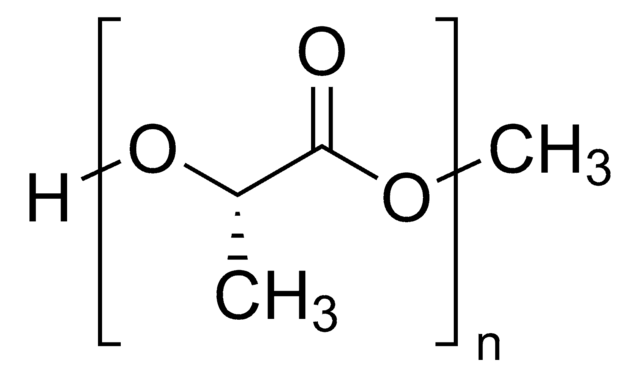67122
Poly(D-lactide)
inherent viscosity ~1.2 dl/g
Sinónimos:
D-Lactide polymer
Iniciar sesiónpara Ver la Fijación de precios por contrato y de la organización
About This Item
Número de CAS:
Número MDL:
Código UNSPSC:
12352209
ID de la sustancia en PubChem:
NACRES:
NA.25
Productos recomendados
mol peso
Mn ~90000
Mp ~95000
Mw ~124000
temp. de almacenamiento
2-8°C
cadena SMILES
CC(O)C(O)=O
Aplicación
Poly(D-lactide) (PDLA), a polymer of a stereospecific cyclic di-ester of lactic acid, is used in biomaterial research for the development of devices such as therapeutic drug delivery vessels. Poly(D-lactide) is used for the preparation of microparticles and resorbable polylactide scaffolds.
Código de clase de almacenamiento
11 - Combustible Solids
Clase de riesgo para el agua (WGK)
WGK 3
Punto de inflamabilidad (°F)
Not applicable
Punto de inflamabilidad (°C)
Not applicable
Equipo de protección personal
Eyeshields, Gloves, type N95 (US)
Certificados de análisis (COA)
Busque Certificados de análisis (COA) introduciendo el número de lote del producto. Los números de lote se encuentran en la etiqueta del producto después de las palabras «Lot» o «Batch»
¿Ya tiene este producto?
Encuentre la documentación para los productos que ha comprado recientemente en la Biblioteca de documentos.
Los clientes también vieron
Jun Shao et al.
The journal of physical chemistry. B, 116(33), 9983-9991 (2012-08-02)
Stereocomplex poly(lactide)s (sc-PLAs) were obtained from solution blending of 3-armed poly(L-lactide) (3PLLA) and linear poly(D-lactide) (PDLA) and between enantiomeric 3PLAs. Differential scanning calorimetry and wide-angle X-ray diffraction results indicated that racemic crystallites were preferentially produced in all the binary blends.
Jingru Sun et al.
The journal of physical chemistry. B, 115(12), 2864-2869 (2011-03-10)
The effects of the addition of poly(D-lactide) (PDLA) on the crystallization behavior of poly(L-lactide)(PLLA) were investigated by means of differential scanning calorimetry (DSC) and temperature-dependent X-ray diffraction(XRD). When the blends were cooled from different temperatures (250, 240, and 190 °C)
J R Sarasua et al.
Journal of materials science. Materials in medicine, 22(11), 2513-2523 (2011-08-23)
Bioresorbable polylactides are one of the most important materials for tissue engineering applications. In this work we have prepared scaffolds based on the two optically pure stereoisomers: poly(L: -lactide) (PLLA) and poly(D: -lactide) (PDLA). The crystalline structure and morphology were
Jamal S Lewis et al.
Biomaterials, 33(29), 7221-7232 (2012-07-17)
Microparticulate systems for delivery of therapeutics to DCs for immunotherapy have gained attention recently. However, reports addressing the optimization of DC-targeting microparticle delivery systems are limited, particularly for cases where the goal is to deliver payload to DCs in a
Nuestro equipo de científicos tiene experiencia en todas las áreas de investigación: Ciencias de la vida, Ciencia de los materiales, Síntesis química, Cromatografía, Analítica y muchas otras.
Póngase en contacto con el Servicio técnico







